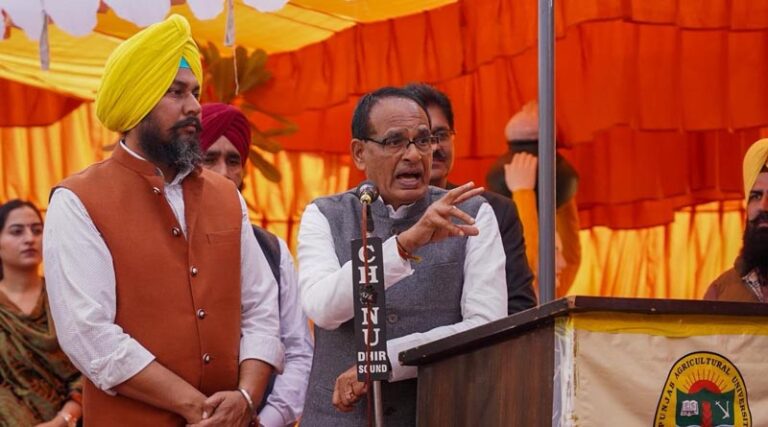
As Delhi AQI Hits Severe Levels, This Punjab Village Offers a Real Solution to Stubble Burning
27 November 2025, Moga: As Delhi continues to grapple with hazardous air quality and rising pollution levels, Punjab’s Ransinh Kalan village is offering a breath of fresh air. During a field visit on Thursday, Union Minister for Agriculture and Farmers’ Welfare and Rural Development, Shivraj Singh Chauhan, interacted with farmers and villagers, commending their adoption of scientific practices that eliminate the need to burn paddy stubble.
The minister said the village has demonstrated that “fields can be cleared and the next crop can be prepared without setting fire to residues,” providing a model that can inspire agricultural communities nationwide.
Punjab’s Leadership in Stubble Management
Addressing farmers and stakeholders, Chauhan said that the annual surge in stubble burning had become a matter of national concern, destroying beneficial insects and contributing to severe air pollution. He noted that Punjab has made remarkable progress this year, reporting a significant decline in stubble-burning incidents.
Ransinh Kalan, he said, stands out for presenting a replicable model where residues are managed through scientific interventions rather than fire. He reiterated that the Centre will promote this model across India to equip farmers with practical alternatives and encourage environmentally conscious farming.
Six Years Without Burning: A Sustainable Rural Success Story
For six consecutive years, farmers in Ransinh Kalan have not burnt crop residues. Instead, they incorporate stubble back into the soil using technologies such as direct seeding and Happy Seeder. The result: improved soil organic carbon, reduced dependence on chemical fertilizers, and stable yields.
The minister congratulated village sarpanch Preet Inderpal Singh and the entire community, saying the village is sending a strong message to regions still struggling with residue management—that mulching and residue incorporation can enhance soil health while conserving water, diesel and input costs.
On-Farm Technical Dialogue with Farmers
Standing in farmer Gopal Singh’s wheat field, Chauhan reviewed the progress of directly seeded wheat and explained key scientific aspects of germination, crown root development and irrigation. He noted that the crop had remained healthy for a month without initial irrigation, demonstrating significant savings in water and diesel.
He added that farmers are now needing less DAP and urea, without any anticipated drop in yield. Residue mulching, he said, is suppressing weeds, conserving moisture and preserving beneficial soil organisms—benefits that were earlier lost to burning.
The minister highlighted how incorporating stubble creates natural mulching, helping regulate soil temperature, retain moisture and reduce weed pressure. This lowers farmers’ expenditure on irrigation, weeding and chemical sprays, while steadily improving soil organic carbon.
He said the Punjab experience clearly shows that environmental protection and higher farm incomes can move hand in hand when scientific practices are sincerely adopted at the field level and supported by active community and panchayat participation.
Push for Oilseeds to Reduce Import Dependency
During the interaction, Chauhan encouraged farmers to expand area under oilseeds such as mustard. He said India remains heavily dependent on edible oil imports, and farmers can play a major role in correcting this by diversifying a part of their land to oilseed crops.
Thanking the villagers for their proactive thinking, he called this contribution “true national service.” Initiatives emerging from a progressive state like Punjab, he said, can accelerate the national oilseed mission.
From the fields of Ransinh Kalan, the minister announced a major reassurance: farmers sowing tur, urad, masoor and chana will have their entire produce procured at Minimum Support Price (MSP), subject to registration. He said this is a fair expectation from farmers—if assured of remunerative prices, they are ready to produce more. Increased pulse production, he added, will strengthen national protein security and stabilize dal prices.
A Model Village Leading by Example
Shivraj Singh Chauhan applauded the village panchayat for setting new benchmarks in environmentally responsible farming, residue management, crop diversification, community participation and efforts towards de-addiction. Collective decisions at the village level and initiatives promoting water-saving crops have earned Ransinh Kalan the reputation of a true “model village.”
He also appreciated the hospitality of villagers, calling the traditional desi makki di roti not just food but “a symbol of Punjab’s warmth, affection and cultural values.”
Policy Direction Rooted in Field Realities
The minister said real development can only emerge from ground-level engagement—standing in fields, speaking directly with farmers and understanding their challenges. This is why he continues to tour villages across states.
He assured that feedback from Punjab’s farmers and model villages like Ransinh Kalan will help shape policies that are more outcome-driven, aligned with local needs and environmentally responsible. The government, he said, remains committed to making agriculture profitable and strengthening rural India.
Also Read: CNH Industrial Finance Europe S.A. 1.875% Notes Due 2026 Notice Of Redemption
📢 If You’re in Agriculture, Make Sure the Right People Hear Your Story.
From product launches to strategic announcements, Global Agriculture offers unmatched visibility across international agri-business markets. Connect with us at pr@global-agriculture.com to explore editorial and advertising opportunities that reach the right audience, worldwide.






